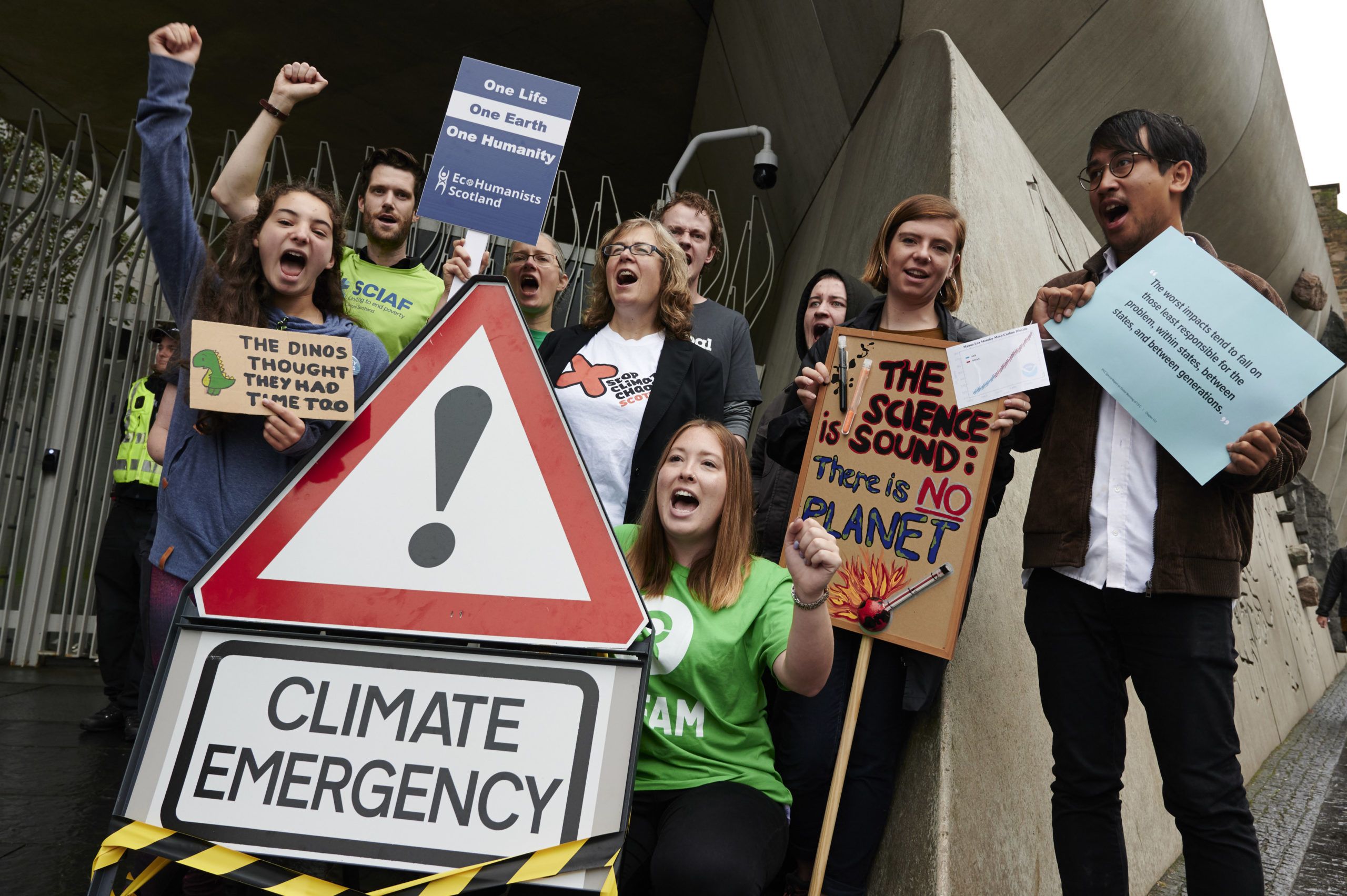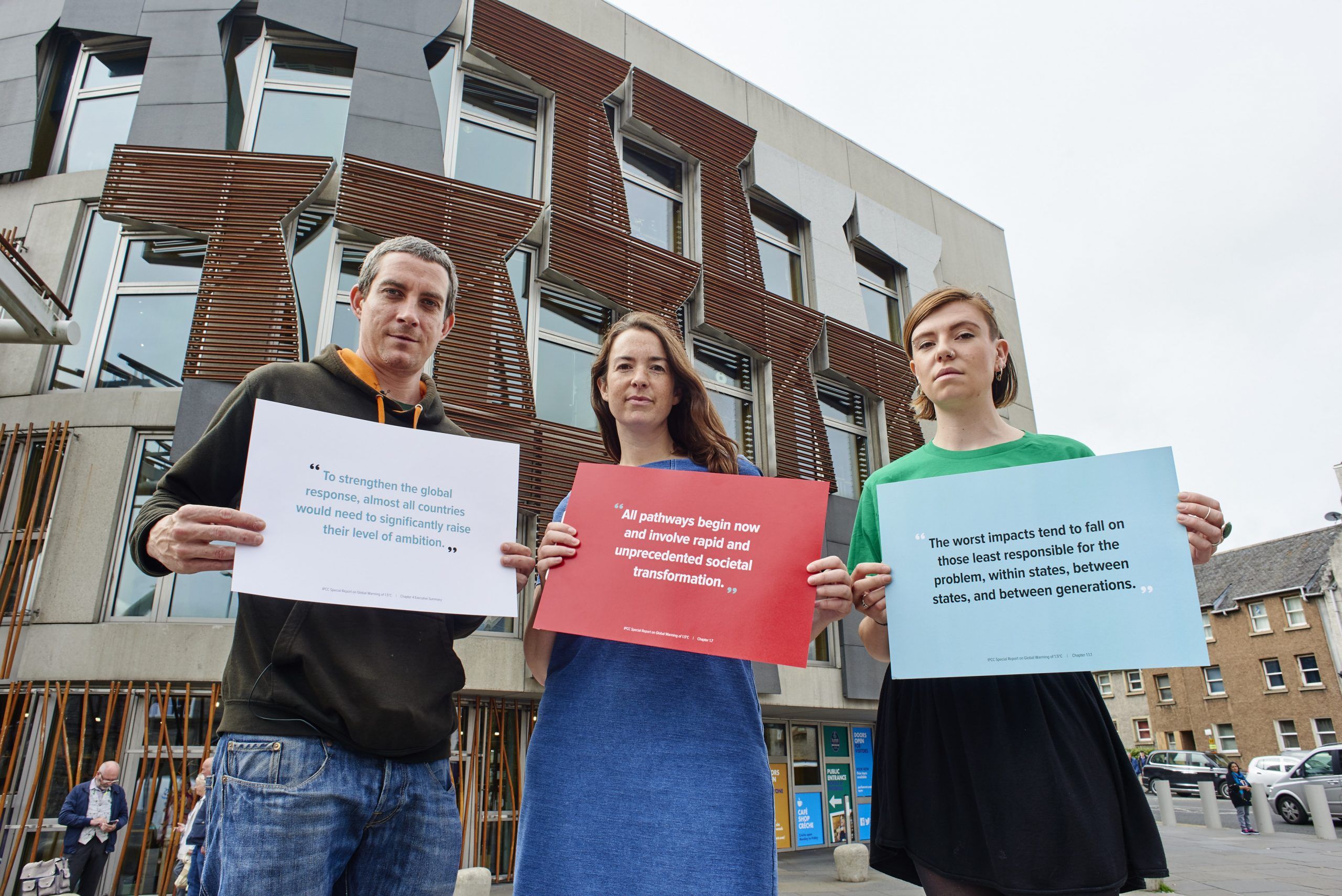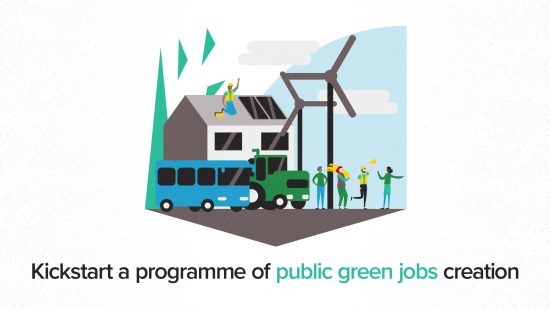
One year on from Scotland’s new climate law – what action have we seen?
Early in the morning on Thursday 25th September 2019, a crowd was gathering outside the Scottish Parliament. Climate emergency signs appeared at every entrance, and on the Royal Mile a group of faith leaders, youth strikers and climate campaigners were getting ready to greet MSPs as they arrived for work.
MSPs were preparing to cast their final votes on our country’s new Climate Act that afternoon – setting in law targets that would determine all our futures. We were there to remind them of what was at stake, and what action was needed.
⚠⚠ CLIMATE EMERGENCY AT THE SCOTTISH PARLIAMENT ⚠⚠
Tell your MSPS to vote for stronger targets today in the Climate Bill!https://t.co/A4bm11urY4 pic.twitter.com/72QOOOH2eY
— Caroline Rance (@CaroRance) September 25, 2019
UN climate experts at the IPCC had warned that the next decade was crucial for climate action, and MSPs had 3 options that day for what Scotland should do over that time. They could vote for a 2030 target of 70%* (the option put forward by Government, barely an increase on the old targets set 10 years prior), 75% (proposed by Labour and the Lib Dems) or 80% (proposed by the Greens).
So we gathered outside, hooked up the microphone and, as MSPs started arriving, we read to them from the IPCC special report on 1.5ºC of warming.

People power
The Climate Act had been a long campaign of over 3 years and throughout the government had been stubbornly resistant to increasing their climate ambition. But people power was building.
The final vote came just five days after the youth climate strikers had organised Scotland’s largest ever climate protest. They had joined millions around the world in demanding action in line with what the science demanded. Thousands of people had emailed their MSPs, hundreds had phoned them up or met them in person, demanding improved targets.
At lunchtime, I got word that the Scottish Government was bowing to the public pressure.
The public demand forced them to vote for a higher target – not all of what we wanted – but 75% by 2030 was a significant shift.
Today, the Scottish Government proudly declares that they have ‘world leading’ targets. Targets are commitments to act. It’s now time to deliver on them.
A year on, what’s happened?
Well, the truth is, very little. In April, the Scottish Government was due to publish a new Climate Change Plan setting out how they would meet the new 2030 target. That was understandably postponed due to covid, but it does mean we’ve effectively lost a crucial year of climate action.
Instead, during the past twelve months we’ve also seen the government give more money to oil and gas companies, and promise to build more big roads while plans to bring in low emission zones in city centres have been delayed.
Fossil free Scotland by 2030
This must be the decade Scotland breaks free from fossil fuels. The Scottish Government has promised to bring back the Climate Change Plan in December, and an Energy Strategy in the New Year.
Nothing less than a rapid shift away from fossil fuels will do. We need an end to North Sea oil and gas, a just transition for workers and creation of good, green jobs. Serious work is needed to replace fossil fuels with renewables in our energy systems, home heating and transport network. And it must start now.
Only around half of the electricity generated in Scotland comes from renewables, while just 6% of our heat is renewable. And in transport, emissions have been rising instead of falling.

We need a Just and Green Recovery
The decisions the Government makes about our recovery from the covid-19 pandemic will shape our climate and communities for decades to come. We’ve set out our plan for how green jobs and climate action can help build a greener, fairer Scotland as we come out of this crisis.
We’re calling on the Government to kickstart a programme of green jobs, with huge investment in energy efficiency, green transport and renewable heating in our homes. There should be no recovery funding for fossil fuel projects. Instead, the government must start planning for a Just Transition – speaking directly to workers, Trade Unions and communities to support them.
Keep up the pressure!
We can’t meet physically at the minute, but our voices are still important. We have power when we act together, and the climate law proved that we can force change in Government and Parliament.
We must remember that it was thanks to every single one of you that met, emailed and phoned your MSPs, marched on the streets or organised in your communities that the Scottish Government committed to higher climate targets. Now we need to keep up the pressure to make sure they deliver on them!
